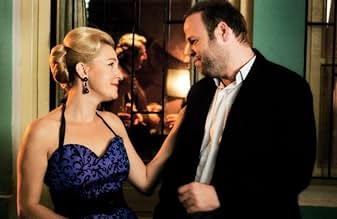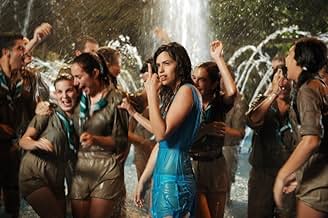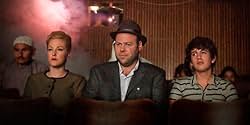Aggiungi una trama nella tua linguaDuring the summer of 1968 a teenage boy goes to work for a matchmaker who has survived the Holocaust - both their lives are forever altered.During the summer of 1968 a teenage boy goes to work for a matchmaker who has survived the Holocaust - both their lives are forever altered.During the summer of 1968 a teenage boy goes to work for a matchmaker who has survived the Holocaust - both their lives are forever altered.
- Regia
- Sceneggiatura
- Star
- Premi
- 4 vittorie e 7 candidature totali
Yarden Bar-Kochba
- Nili Burstein
- (as Yarden Bar Kochva)
Yael Levental
- Tikva Abadi
- (as Yael Leventhal)
Kobi Farag
- Moshe Abadi
- (as Kobi Faraj)
Eyal Shehter
- Arik Burstein (Adult)
- (as Eyal Schechter)
Ya'ackov Bodo
- Advocate Segelson
- (as Yaacov Bodo)
Ben Kippris
- Yoram
- (as Ben Kipris)
Recensioni in evidenza
THIS is how movies should be made -- but all to often are not...! When it comes to the movies that have been coming out in the past 30-plus years, but most especially the past 15 years, I pretty much have lost my appetite for film-watching as a hobby. Fortunately, there are some exceptions to the rule, the THE MATCHMAKER, set in Israel, is one of them! Forget the Hollywood formula flicks, special effects, "cool" creeps and so much in recent films that have all but ruined movies for me. Once in a while, when I have just about lost all hope, I can still find a jewel like this film.
I'm not going to tell you anything about it, except that it is "all that," without the vulgarities that run rampant in films today or the philosophical slants that try to convince the viewer that black is white and white is black. Nope. It's just excellent -- the story line, the cinematography, the acting, the settings. Just plain excellent. BRAVO!
I'm not going to tell you anything about it, except that it is "all that," without the vulgarities that run rampant in films today or the philosophical slants that try to convince the viewer that black is white and white is black. Nope. It's just excellent -- the story line, the cinematography, the acting, the settings. Just plain excellent. BRAVO!
"The Matchmaker" (or Once I Was in Hebrew) is a movie by Avi Nesher, one of Israel's finest directors and one who has shaped Israeli cinema for decades.
The movie centers around the memories of an author, when he was a kid in 1968 in Haifa and the relationship he had with his father's childhood friend, Yankale Bride (Adir Miller).
Yankale Bride is a Matchmaker who recruits Erik (Tuval Shaffir, the author) for a summer job to search for people who wish to get married. The movie centers around all of Erik's tales and adventures during that summer vacation: How he falls in love with Tamara (Neta Porat), how he writes about his life as a mystery book, his love for spy and mystery tales and his encounter with the secrets of his fellow Yankale Bride.
Adir Miller and Maya Dagan are a good duo together throughout the whole film. The rest of the cast is perfect and lovely. The focus on the characters is really delicate. The movie shows the struggle of the characters facing the aftermath of the Holocaust and how people didn't know much about it.
The movie in general focuses on the theme of coming to age among kids, most certainly Erik, who narrates the movie throughout its span. Overall I really enjoyed it, Avi Nesher is known to be a director who focuses on many themes and genres in his movies, just like Spielberg. Even though many believe his movies to be too deep and heavy, this one is less heavy and more emotional and entertaining. Highly recommend it.
The movie centers around the memories of an author, when he was a kid in 1968 in Haifa and the relationship he had with his father's childhood friend, Yankale Bride (Adir Miller).
Yankale Bride is a Matchmaker who recruits Erik (Tuval Shaffir, the author) for a summer job to search for people who wish to get married. The movie centers around all of Erik's tales and adventures during that summer vacation: How he falls in love with Tamara (Neta Porat), how he writes about his life as a mystery book, his love for spy and mystery tales and his encounter with the secrets of his fellow Yankale Bride.
Adir Miller and Maya Dagan are a good duo together throughout the whole film. The rest of the cast is perfect and lovely. The focus on the characters is really delicate. The movie shows the struggle of the characters facing the aftermath of the Holocaust and how people didn't know much about it.
The movie in general focuses on the theme of coming to age among kids, most certainly Erik, who narrates the movie throughout its span. Overall I really enjoyed it, Avi Nesher is known to be a director who focuses on many themes and genres in his movies, just like Spielberg. Even though many believe his movies to be too deep and heavy, this one is less heavy and more emotional and entertaining. Highly recommend it.
10zaaq
1. Not the greatest actors and accents but it boasts carefully written dialogue, captivating characters, and an aesthetically pleasing 70's summer vibe of the region.
2. This movie packs dating angst and teenage nostalgia (for today's boomers), which isn't difficult to relate - mandela effect, anyone? ;P
3. The plot has a nice pace (no stalling/filler imo) and there are moral lessons all along the way. Some lines even came back to me just now; so I decided to recommend it.
Please let me know if you liked me review, it helps :) Thanks
2. This movie packs dating angst and teenage nostalgia (for today's boomers), which isn't difficult to relate - mandela effect, anyone? ;P
3. The plot has a nice pace (no stalling/filler imo) and there are moral lessons all along the way. Some lines even came back to me just now; so I decided to recommend it.
Please let me know if you liked me review, it helps :) Thanks
The Israeli movie Once I Was (Pa'am Hayiti) was shown in the US with the title The Matchmaker (2010). It was written and directed by Avi Nesher. The film was very popular in Israel, where it won four Israeli Academy Awards. The other reviewers of this film are either Israelis or are familiar with Israeli culture, so they can do a better job than I can discussing the reality of the movie. For example, it is set in the seaport of Haifa in 1968, and there are questions about the authenticity of the sets and the accents. I will leave these topics to the experts.
I'm reviewing the film more on its plot and acting. The plot is fascinating. A Holocaust survivor, Yankele Bride (Adir Miller) is a smuggler and petty criminal. That's his profession, but his hobby is matchmaking. His job is to find mates for people who, for whatever reason, are considered undesirable.
The saddest of these people is a young woman, Sylvia, who is very beautiful but has achondroplasia. (The role is played by the extraordinary actress Bat-El Papura.) Sylva wants to be married, but no person of normal height will consider her as a spouse. Even the hapless character called Meir the Librarian turns away from Sylvia when he meets her. Yankele does his best for her, but he never succeeds.
The most obvious theme of the movie is a coming-of-age story of Arik Burstein (Tuval Shafir), whose father is also a Holocaust survivor. Arik starts work as Yankele's "spy," the person who checks out the matchmaker's clients to make sure that they are who and what they say they are. (There's another theme about a visiting American cousin, who is a liberated young woman, but that subplot never goes anywhere.)
The key theme, as I saw it, is that Holocaust survivors were welcomed to Israel, but they weren't admired or honored. As Arik's father says, "people always want to know what we had to do in order to survive." The clash of cultures--eastern European survivors who were seen as victims vs. Israelis who had fought for independence--is in the background of the entire movie. (Sometimes this clash is overt, sometimes it's subtle, but it's always there.)
Of course, Arik is impressed by the brash, streetwise Yankele, as opposed to his own quiet, respectable father. We are supposed to be impressed by Yankele too, because his criminal activities are treated as amusing foibles. I don't think that smuggling goods into Israel was an appropriate way to thank the country that took you in, but he is definitely a likable character in the movie. Each viewer will have to decide about Yankele for herself or himself.
I liked this film well enough to suggest that it's worth seeing if it comes along. I'm not sure it's a movie I would seek out for viewing. We saw The Matchmaker at the excellent Rochester Jewish Film Festival, screened at the wonderful Dryden Theatre at George Eastman House. It will work equally well on a small screen.
I'm reviewing the film more on its plot and acting. The plot is fascinating. A Holocaust survivor, Yankele Bride (Adir Miller) is a smuggler and petty criminal. That's his profession, but his hobby is matchmaking. His job is to find mates for people who, for whatever reason, are considered undesirable.
The saddest of these people is a young woman, Sylvia, who is very beautiful but has achondroplasia. (The role is played by the extraordinary actress Bat-El Papura.) Sylva wants to be married, but no person of normal height will consider her as a spouse. Even the hapless character called Meir the Librarian turns away from Sylvia when he meets her. Yankele does his best for her, but he never succeeds.
The most obvious theme of the movie is a coming-of-age story of Arik Burstein (Tuval Shafir), whose father is also a Holocaust survivor. Arik starts work as Yankele's "spy," the person who checks out the matchmaker's clients to make sure that they are who and what they say they are. (There's another theme about a visiting American cousin, who is a liberated young woman, but that subplot never goes anywhere.)
The key theme, as I saw it, is that Holocaust survivors were welcomed to Israel, but they weren't admired or honored. As Arik's father says, "people always want to know what we had to do in order to survive." The clash of cultures--eastern European survivors who were seen as victims vs. Israelis who had fought for independence--is in the background of the entire movie. (Sometimes this clash is overt, sometimes it's subtle, but it's always there.)
Of course, Arik is impressed by the brash, streetwise Yankele, as opposed to his own quiet, respectable father. We are supposed to be impressed by Yankele too, because his criminal activities are treated as amusing foibles. I don't think that smuggling goods into Israel was an appropriate way to thank the country that took you in, but he is definitely a likable character in the movie. Each viewer will have to decide about Yankele for herself or himself.
I liked this film well enough to suggest that it's worth seeing if it comes along. I'm not sure it's a movie I would seek out for viewing. We saw The Matchmaker at the excellent Rochester Jewish Film Festival, screened at the wonderful Dryden Theatre at George Eastman House. It will work equally well on a small screen.
This film is a success on several levels. First of all, it is an engrossing drama and coming of age story and second it recreates a time and place long gone. The coming of age story involves a 16 year old boy's contact with a warm hearted but slightly sleazy character from his father's youth. Perhaps I related to this young man because I too, at the age of 16, had a similar character in my life. And life after all, is about learning to deal with various situations, some of which have to potential to corrupt you, but all of which are learning experiences. Many films present a story, but do not give you a reason to care about the characters. This film fully develops the characters and, consequently, give you a reason to care about their outcomes. Some reviews have a criticized a sub plot involving a beautiful young women. Really, were you ever a 16 year old boy?. Is it possible to have a story about a 16 year old and not have sex in it?
I also liked the recreation of 1968 Israel, a place and time I never saw even though I was offered a summer kibbutz experience as a 16 year old in 1969. The Hebrew name of the film translates as "Once I was". The Israel of today, which I know well (I learned to speak Hebrew as an adult), is very different, in some ways better and some ways worse. I cannot speak for the authenticity of the recreation, but the film certainly captured some of the major conflicts in the society without ever devolving to into an anti-Israel film.
The original name was a good choice and is more descriptive. Overall, this film is a success as a drama and as an historical essay.
I also liked the recreation of 1968 Israel, a place and time I never saw even though I was offered a summer kibbutz experience as a 16 year old in 1969. The Hebrew name of the film translates as "Once I was". The Israel of today, which I know well (I learned to speak Hebrew as an adult), is very different, in some ways better and some ways worse. I cannot speak for the authenticity of the recreation, but the film certainly captured some of the major conflicts in the society without ever devolving to into an anti-Israel film.
The original name was a good choice and is more descriptive. Overall, this film is a success as a drama and as an historical essay.
Lo sapevi?
- QuizAuthors mentioned by Meir and Arik in the library include Dashiell Hammett, Ernest Hemingway, Shmuel Yosef Agnon (1888 -1970; Nobel Prize laureate writer and a major figure of modern Hebrew writing) and Yehiel Dinur (1909 - 2001; also spelled Dinoor or De-Nur; also known by his pen name Ka-Tsetnik, a Jewish writer and Holocaust survivor).
- BlooperArik has a promotional picture of John Wayne from the film, "The Cowboys:", on his wall. This film was not released until i972, 4 years after this film's setting.
- Curiosità sui creditiComposer Philippe Sarde wishes to dedicate his score in memory of his grandmother Marie.
- ConnessioniReferences Il monello (1921)
- Colonne sonoreBalkan Folk Songs
Accordion by Anatolie Gieko
Violin by Pavel Levine
I più visti
Accedi per valutare e creare un elenco di titoli salvati per ottenere consigli personalizzati
Dettagli
Botteghino
- Budget
- 2.150.000 USD (previsto)
- Lordo in tutto il mondo
- 2920 USD
- Tempo di esecuzione
- 1h 52min(112 min)
- Colore
- Mix di suoni
Contribuisci a questa pagina
Suggerisci una modifica o aggiungi i contenuti mancanti

































